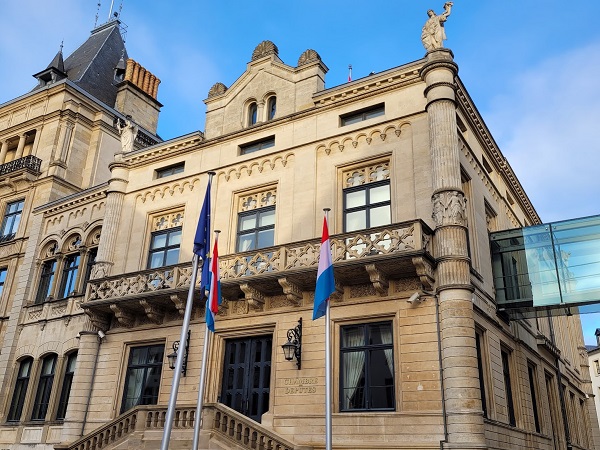 Chamber of Deputies building;
Credit: Jazmin Campbell
Chamber of Deputies building;
Credit: Jazmin Campbell
At the end of November, Luxembourg’s Prime Minister Xavier Bettel and the Minister of Health Paulette Lenert announced plans to tighten COVID-19 restrictions amid rising cases and the emergence of the Omicron variant.
On Thursday 16 December 2021, the new COVID-19 law passed in the Chamber of Deputies (Luxembourg’s Parliament), with 31 votes for the bill and eight votes against it. Unsurprisingly, the ruling coalition parties (Democratic Party – DP, Luxembourg Socialist Workers’ Party – LSAP and the Greens) voted in favour, whilst the Alternative Democratic Reform Party (ADR), the Left and the Pirate Party voted against the bill. The 21 MPs representing the main opposition party, the Christian Social People’s Party (CSV), abstained from the vote.
So, what exactly do these new rules mean?
As of Friday 17 December 2021, the so-called 2G CovidCheck system has been put in place for entry to hospitality and leisure venues. This means that access to restaurants, cafes, bars and clubs, among other venues, is limited to people with a certificate proving that they are fully vaccinated (geimpft in Luxembourgish) or have recovered (geheelt) from COVID-19 in the last six months. Tests are no longer valid, except for staff. This 2G system also applies to groups of more than ten people during sports or cultural activities. Children aged between 12 years and two months and 19 years are subject to the 3G CovidCheck rules, meaning they must be vaccinated (geimpft), recovered (geheelt) or provide a negative test result (getest).
From 15 January 2022, the 3G CovidCheck system will become mandatory in the workplace in Luxembourg. Employees will only be allowed to access their workplace if they are vaccinated, recently recovered or tested negative (PCR, valid for 48 hours, or rapid antigen test, valid for 24 hours) for COVID-19. These rules do not apply to remote working. The government already announced these measures at the end of November, with the aim of allowing people enough time to get vaccinated before the introduction of these new rules.
The bill also authorises pharmacists to administer vaccinations to people over the age of 16, without a medical prescription.
Anyone who cannot get vaccinated for health reasons may apply for a medical contraindication certificate, according to the criteria set out by the Director of Health.
Regarding changes to the rules for gatherings, there are no restrictions for groups of up to ten people. Groups of between eleven and 50 people are required to keep an interpersonal distance of two metres and wear a mask, although this can be replaced by the CovidCheck system. Groups of between 51 and 200 people must follow the above rules plus be seated throughout the event. The 2G CovidCheck system is mandatory for gatherings of between 201 and 2,000 people, except in the case of protests, outdoor markets or in public transport. Gatherings involving more than 2,000 people require prior authorisation of the Directorate of Health.
The new rules will remain in place until 28 February 2022.
Reactions to the restrictions
Since their announcement back in November, the new COVID-19 rules have sparked controversy in Luxembourg. Trade unions have voiced their opposition to the mandatory introduction of the CovidCheck system in the workplace, warning that it could lead to division and discrimination against unvaccinated employees.
Just before the new COVID-19 law entered into force, the Federation of Skilled Trades and Crafts warned that the 3G system at work could pose huge organisational issues for companies. The warning followed reports of several employees telling their employers that they would go on sick leave to avoid having to test daily.
The recent protests in Luxembourg are also proof that not everyone is content with the new measures – even though they are less strict than in other European countries.
Impact of the new measures
And yet, the new rules do seem (so far) to have had the desired effect of encouraging more people to get the jab: since the government announcement on 29 November 2021, 11,885 first vaccine doses have been administered in Luxembourg, bringing the total number of first doses administered as of 19 December 2021 to 457,987. With the mandatory introduction of the 3G CovidCheck system in the workplace fast approaching, this figure seems likely to rise further in the coming weeks. This trend is also confirmed by the huge lines outside pharmacies and pop-up vaccination centres in recent days, although those queueing also include people getting their booster jab.
Despite this (seemingly) positive preliminary assessment, only time will tell if the new COVID-19 law is enough to curb the spread of Omicron without further dividing the nation.









